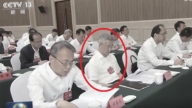【新唐人2013年07月30日讯】7月28号,中共审计署在官网发布消息声称,“近日,根据国务院要求,审计署将组织全国审计机关对政府性债务进行审计。”主持起草中共第一部企业破产法的曹思源对本台记者表示,当局近期这项对地方债务的审计,可能是对中国各地负债累累的地方政府来一个摸底。不过,专家分析,地方债务大多涉及官员贪腐,真实的曝光地方政府的负债情况会遇到重重阻力。
据官方媒体报导,7月26号国务院发出“特急明电”,要对全国政府性债务进行审计。全国性审计工作将于8月1号起全面展开。这次审计署将对中央、省、市、县、乡五级政府性债务进行彻底摸底和测评。
作为美国第四大城市的底特律最近申请破产。曾经在中共国务院办公厅和国家体改委工作,现任“思源兼并与破产咨询事务所”所长的曹思源对《新唐人》表示,中共过去认为社会主义国家不存在破产问题,因此废除了民国时期的《六法全书》包括破产法。
中国思源兼并与破产咨询事务所所长曹思源:“大陆的破产法重新制定是1980年我发表文章首先提出来,然后我到国务院工作的时候继续努力,最后进行起草工作。企业破产法在88年11月1日开始生效。”
但是到目前为止,破产的观念仅限于企业,政府长期以来被认为不可能破产。曹思源表示,这一次底特律的申请破产,使人们猛醒,只要是债务人不能够清偿到期债务,还不起债,就有可能陷于破产。因此人们重新注意地方政府破产问题。为了防止这种情况突然发生,审计部门决定对全国地方政府开展债务审计。
曹思源:“地方政府因为长期以来没有破产的观念,举债没有任何的严密思维。我举债能不能还啊?还得起、还不起啊?我拿什么去还啊?这些问题都不考虑。我只要想借债就借债,想担保就担保,所以地方债台高筑。”
中国有12座所谓的鬼城,就是大面积开发但是无人居住的房地产。它们包括内蒙古鄂尔多斯康巴甚、河南郑州郑东新区、河南鹤壁、辽宁营口、江苏常州等地。曹思源认为,如果房地产开发有投入、无产出,这12个城市将面临破产还债的问题。
审计地方政府的债务,很可能牵出背后的官员贪腐黑幕,宣布地方政府破产可能将令地方领导人乌纱帽不保。这使得从地方到中央,曝光真实债务状况和承认地方政府破产,都存在重重阻力。
曹思源:“越是掩盖债务问题越加混乱。就好像是地上有人埋了地雷,好的办法是通过排雷装置,把这个地雷排除避免踩上地雷、避免损失巨大。相反,如果掩盖这个地雷就是铺上稻草和鲜花,一片莺歌燕舞、最后踩上去就爆炸了,人仰马翻,损失更大。”
现在中国很多地方政府的财政开支远远超过预算。
北京天则经济研究所所长助理段绍译表示,地方政府修建豪华政府大楼,树立形象工程,导致很多地方政府负债累累。而中共的制度缺陷也是债务飙升的一个原因。段绍译说,中共官员的政绩评估体系当中,只看GDP和形象工程,却不看负债多少。
段绍译:“薄熙来在重庆的时候,他建了很多形象工程,比如唱红歌搞十万人比赛,政府没有去考核他花了多少时间、浪费了多少精力。还有重庆街上银杏树多了。市民感觉很好。但是薄熙来欠了几千亿的财政欠款,很多人根本就不知道。 ”
今年中共两会期间,审计署副审计长董大胜表示,截至2010年底,中共中央债务规模在7.7万亿元人民币左右,地方债10.71万亿。国际货币基金组织本月早先时候估算,中央政府和地方政府的债务占到国民生产总值的45%。
采访编辑/秦雪 后制/李月
Local Debt Audit Reveals Bankruptcy of China’s Many Cities
On July 28, the Chinese Communist Party (CCP)’s
National Auditing Office (NAO) announced that:
“Recently, following the State Council’s requirements,
NAO will organize national audit institutions to
audit government debts."
Cao Siyuan, who presided over drafting the CCP’s first
Enterprise Bankruptcy Law, told our reporters that
this audit on local debts could be an assessment of
local governments who are in a serious debt situation.
However, experts say that since most local officials are
involved in corruption, real exposure of local government debt
will encounter a lot of resistance.
According to China’s official media reports,
on July 26, the State Council issued an urgent message
requesting an audit of government debts across the country.
The national audit work will start full-scale on August 1.
This audit will hold a thorough diagnostic evaluation over
the debts of the five levels of government:
central, provincial, city, county and township.
Detroit, the fourth biggest city in the U.S.,
has recently filed for bankruptcy.
Cao Siyuan, president of the Siyuan Merger and Bankruptcy
Consulting Firm, once worked in the General Office
of the State Council and the CCP’s State Council General.
Cao told NTD that, the communist regime thinks as a
socialism country, it wouldn’t have bankruptcy issue,
thus the bankruptcy law in China was abolished previously.
Cao Siyuan: “In 1980, I was the first one who published
an article raising the need to re-enact China’s bankruptcy law.
I continued this effort while I worked at the State Council.
Eventually I worked on drafting it.
The Enterprise Bankruptcy Law came into effect on
November 1, 1988."
So far, the concept of bankruptcy is limited to business.
Government has long been considered impossible go to bankrupt.
Cao Siyuan said the bankruptcy of Detroit woke people up.
As long as a debtor can’t pay off maturing debt,
they may fall into bankruptcy.
So people are paying attention to local government bankruptcy.
To prevent this from happening suddenly, the audit department
decided to carry out government debt audits across the nation.
Cao Siyuan: “For a long time, local governments
haven’t had the concept of bankruptcy.
When incurring debts, there was no thinking over thoroughly
questions such as whether and how to pay it back.
They didn’t think about such issues.
They just borrow and get insurance as they wish.
Thus the debt level of local governments is very high."
China has 12 so-called ‘ghost cities,’
large areas of uninhabited real estate development,
including Erdos Kamba of Inner Mongolia,
Zhengdong New District of Zhengzhou and
Hebi city of Henan Province,
Yingkou city of Liaoning Province and
Changzhou City of Jiangsu Province.
Cao Siyuan says without income from the real estate investments,
these 12 cities will face bankruptcy and debt repayment problems.
Auditing local government debt will likely expose corruption,
and declaring bankruptcy will cause local officials
to lose their positions.
There are layers of obstacles,
from central to local governments,
blocking exposure of the true debt situation
and recognition of local government bankruptcy.
Cao Siyuan: “Cover-up debt makes it increasingly confusing.
It’s like if someone planted a landmine: a good way
to deal with it is to remove it or avoid stepping it.
But if it’s just covered up with lawns and flowers,
whoever steps on it will cause an explosion."
China’s many local governments’ fiscal expenditures
far exceeds their budgets.
Duan Shaoyi, assistant director at Beijing
Tianze Institute of Economics, says
local governments build luxury government buildings
to brush up their image,
resulting in the huge debts of many local governments.
Deficiency of the CCP system is also a reason for soaring debt.
Duan Shaoyi says the performance index for CCP officials
only looks at GDP and image projects, not the debt level.
Duan Shaoyi: “Bo Xilai launched many image projects
when he was in Chongqing,
such as holding the competition involving 10 thousand
people singing CCP songs, for example.
The government didn’t consider
how much time and money he spent.
There are also more trees on Chongqing streets.
But Bo Xilai incurred several billion dollars in debt.
Many people knew nothing of it."
During the CCP’s Two Sessions this year, Dong Dasheng,
Deputy Auditor General of the CCP Audit Commission said that
as of the end of 2010, CCP Central debt is over 7.7 trillion yuan
($1.3 trillion), and local debt is 10.7 trillion yuan ($1.7 trillion).
The International Monetary Fund said earlier this month,
that China’s central and local government debts are estimated
to account for 45% of China’s GDP.





























